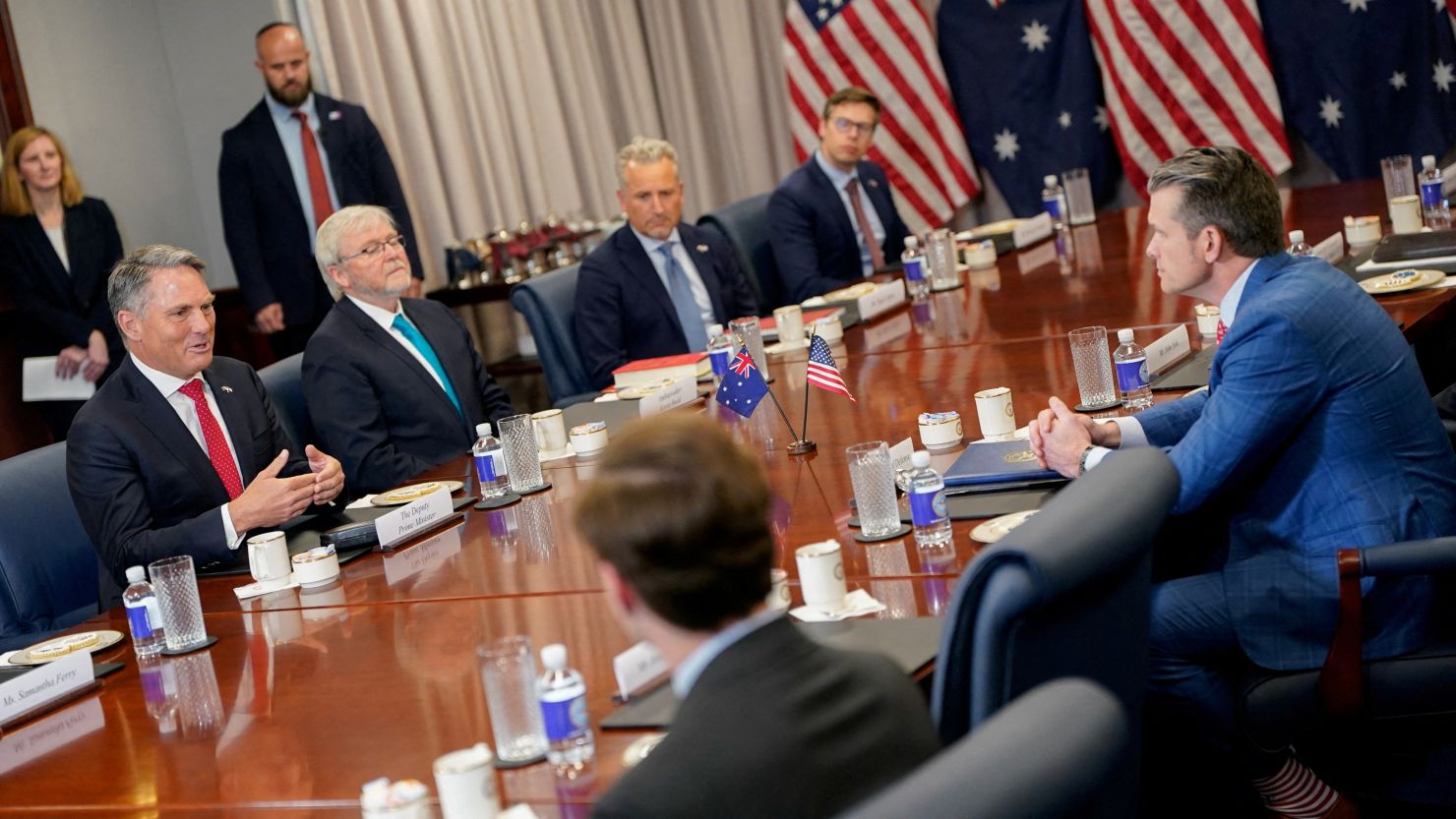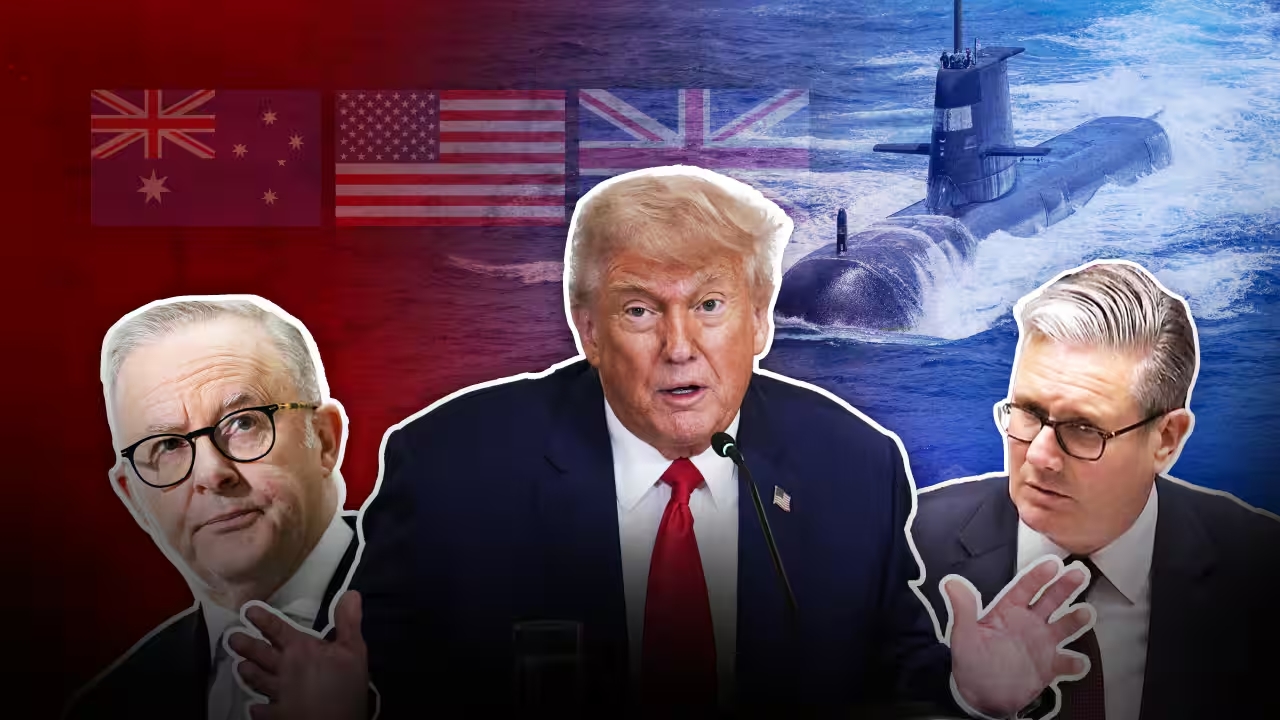
U.S. Defense Secretary Pete Hegseth meets with Australian Defense Minister and Deputy Prime Minister Richard Marles at the Pentagon in Washington, DC, on February 7, 2025. (Photo: Nathan Howard/Reuters)
The United States has launched a review of the AUKUS pact—a trilateral security arrangement between Australia, the United Kingdom, and the United States, signed in 2021. Established behind closed doors and announced with little warning, the agreement abruptly terminated a multi-billion-dollar submarine deal between Australia and France, provoking fury in Paris. France branded the move a “stab in the back,” accusing its allies of deceit.
At the heart of the agreement lies a commitment by the U.S. and UK to provide Australia with nuclear-powered Virginia-class submarines, alongside sensitive technologies and eventual domestic production capabilities. This pivot, explicitly framed as a strategic deterrent to China, introduced a new Cold War logic into the Asia-Pacific, deepening regional anxiety and unsettling Australia’s neighbors.
What shocked many observers more than the deal itself was the swift endorsement it received from the incoming Labor government under Prime Minister Anthony Albanese, following the Liberal Party’s electoral defeat in 2022. Labor’s abrupt about-face, discarding its longstanding opposition to nuclear technology and jettisoning aspirations for an independent foreign policy, raised eyebrows both at home and abroad. To critics, it signaled not strategic clarity but a meek alignment with an increasingly erratic superpower in visible decline.
Over the past four years, AUKUS has unraveled into a diplomatic, political, and financial debacle. Far from strengthening Australia’s sovereignty and security, AUKUS has exposed the nation to greater geopolitical risk, entrenched its subordination to American strategic interests, and strained relations with regional neighbors.
The project’s staggering costs, estimated at up to $368 billion, have already begun to bite. But these figures only tell part of the story. The real cost of AUKUS is the erosion of Australian sovereignty and the entrapment of national defense within an increasingly unpredictable and interest-driven America.
With the Trump administration’s formal review of AUKUS, a glimmer of hope has emerged. Leading the review is Elbridge Colby, the Pentagon’s undersecretary for defense policy, who didn’t hold back during his Senate confirmation hearings in March, openly questioning the feasibility of the deal. He said it’s difficult to support Canberra’s procurement plan when the American naval industrial base is already struggling to meet its own submarine production targets.
Within Australia, the review has re-energized a broad spectrum of AUKUS sceptics. Former prime ministers Paul Keating and Malcolm Turnbull are among those calling on the Albanese government to seize this moment of uncertainty in Washington as an “opportunity” to step away from a misguided entanglement—one that threatens to hollow out Australia’s sovereignty while making it more, not less, vulnerable. For Keating the review “might very well be the moment Washington saves Australia from itself … from the most poorly conceived defense procurement program ever adopted by an Australian government.”
Successive Australian governments, both Coalition and Labor, committed to this generational shift in Australia’s defense posture without an informed debate or democratic mandate. The bipartisan consensus effectively stifled scrutiny, presenting AUKUS as a fait accompli.
The terms of the agreement underscore how lopsided the arrangement truly is. The United States retains the unilateral right to cancel any aspect of the deal, including the transfer of Virginia-class submarines, if it deems that doing so poses “an unreasonable risk to its defense and security.” In other words, Australia’s access to these submarines is likely not guaranteed. And in the event of non-delivery, there is no provision for compensation.

AUKUS is a security agreement between Australia, the United Kingdom and the United States. (Source: SBS News)
Disclosures on design that came later clearly indicated that Australia has been duped to settle in for submarine designs which both the U.S. and UK were replacing. According to Hugh White Australia’s top security analyst, “we faced a choice between committing to an old design that would be obsolete before it entered service or waiting for a new design that would not be delivered until long after the Collins (Australia’s current submarines) were withdrawn.”
Former Prime Minister Paul Keating described the pact as a “colossal surrender of sovereignty.” He had chastised the Morrison government for, “its foreign policy incompetence and fawning compulsion to please America, effectively has us in a cold war with China.”
Keating’s argument is simple yet piercing: Australia has no quarrel with China. And yet, under AUKUS, it is positioning itself on the frontlines of a potential U.S.-China conflict over Taiwan—a conflict that is neither inevitable nor in Australia’s vital national interest.
Beyond financial and sovereignty concerns, AUKUS also introduces a serious destabilizing element to the Asia-Pacific region: nuclear technology. Even if the submarines remain conventionally armed, the presence of nuclear-powered vessels in Australian waters dramatically shifts the region’s security calculus.
Australia, a longstanding supporter of the nuclear non-proliferation regime, risks undermining its moral and diplomatic credibility. Critics across Southeast Asia and the Pacific Islands have already expressed alarm, warning that the pact injects nuclear tension into a region that has historically strived to remain a nuclear-free zone.
Instead of offering stability, AUKUS contributes to an arms race narrative in the Asia-Pacific. By entering into this pact, Australia positions itself not as a regional stabilizer, but as a forward operating post in America’s escalating rivalry with China. This posture weakens its ability to engage constructively with neighbors like Indonesia and Malaysia and distances Australia from its once-prized middle-power diplomacy.
What makes AUKUS particularly concerning is its promise of protection—at a time when that assurance is increasingly less certain. The Trump administration’s disregard for traditional alliances, have cast serious doubt on the reliability of American commitments.
The alliance makes Australia a junior player in an American military strategy that demands loyalty and offers no guarantee of reciprocity.
The fundamental question remains: How did Australia get here? Some observers believe it was “deliberately designed by the Coalition to wedge Labor” ahead of the 2022 election. It was a policy, driven by politics, not by principle or pragmatism.
It is not too late to reverse course. Malcolm Turnbull, whose government negotiated the now-cancelled French submarine deal, has urged Australians to “wake up” and reassess the pact before it’s too late.
The greater threat to Australia is not China’s rise, but the gradual loss of its ability to make independent choices. Without a careful re-evaluation of AUKUS, Australia’s autonomy could be at risk in a pact that aimed to enhance security but might limit its freedom.
